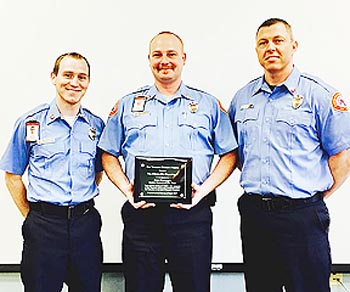Clinton Fire Department wins award for child passenger safety efforts

Receiving the “Child Passenger Safety Agency of the Year” award on the behalf of the city was Lt. Daniel Adams, Firefighter Joe Riggs, and Firefighter Brice Kidwell.
The “Child Passenger Safety Agency of the Year” award was presented to the department by the East Tennessee Children’s Hospital. Receiving the award on the behalf of the city was Lt. Daniel Adams, Firefighter Joe Riggs, and Firefighter Brice Kidwell.
For several years, the Clinton Fire Department has hosted a monthly child passenger safety seat inspection point. This occurs on the first Tuesday of every month from 5 - 8 p.m.
There are also technicians on duty everyday for anyone to stop by whenever the need arises. These checkpoints and this car seat program are made possible with the support of the City of Clinton administration and the fire Chiefs.
The program is in partnership with East Tennessee Children’s Hospital and funded by the Pilot Corporation Safe Travels Program. The monthly checkpoints are also staffed with technicians from neighboring agencies such as the Anderson County Sheriff’s Office, the Tennessee Highway Patrol and others.
The program started several years ago with only one or two technicians and has built a little each year.
This past year, the department hosted a three-day class, certifying several additional technicians making the majority of the department certified. As the word gets out about the program, the number of people coming to get their car seats checked have increased.
This program is 100-percent grant funded and staffed with technicians of the fire department and their partners allowing it to be completely free to the community.
When a seat is taken to the fire department, it is checked top to bottom for any structural issues.
The expiration date is checked and it is checked against a recall list. The seat is then installed, insuring the parent or guardian understands how to install it correctly and then the child is secured in the seat properly. If the seat is determined to be unsafe in any way, it is replaced free of charge.
In 2015 alone, the fire department and its partners inspected over two hundred seats and replaced about 48-percent of those.
Of the seats checked, over 80-percent were found to have some kind of safety issue that had to be corrected.

